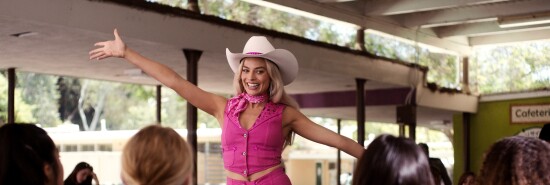
The sad, shallow world of Barbie
Madeline Fry Schultz
Video Embed
If historians look back on the year 2023 to study the state of mainstream feminism, they need only watch the Barbie movie.
The film was originally planned to star Amy Schumer, which tells you it was meant to be more of an I Feel Pretty-style social commentary than a live-action remake of millennial women’s beloved Barbie cartoons.
THE DEPARTMENT OF JUSTICE MUST JUSTIFY HUNTER’S SPECIAL TREATMENT
When the project wasn’t “feminist” enough, however, Schumer dropped out, leaving a hot pink vacuum to be filled by Margot Robbie, who enlisted Greta Gerwig (of Ladybird and Little Women fame) to write and direct. They attempted to split the difference.
This version, which Schumer herself has conceded looks “very feminist and cool,” aims to make gobs of cash for Mattel by capitalizing on adult nostalgia and burnishing Barbie’s image as a relic of the past by finally bringing her into the 21st century,
From its opening moments, Barbie is intent on telling viewers that it is about feminism, and it takes itself seriously (but not too seriously). In a scene riffing off 2001: A Space Odyssey, little girls smash their boring baby dolls when Barbie comes along, helping them to aspire to a life other than that of a mother. Motherhood is only fun for a while, anyway; just “ask your mother,” the narrator intones.
Then we’re taken to Barbieland, the matriarchal paradise in which Barbie and her friends hold all positions of power. As in girls’ imaginations, the Kens are little more than accessories to their Barbies. When our heroine, “stereotypical” Barbie (Robbie), starts having existential thoughts and — gasp! — discovering cellulite, she flees to the human world to fix herself and go back to the perfect way things were.
In our world, Barbie, and tagalong Ken, realize that life is not like Barbieland. It is ruled by the patriarchy, we are told multiple times. Men are lecherous, and little girls don’t like Barbie dolls. When Barbie finds the little girl who used to play with her, tween Sasha (Ariana Greenblatt) is no fan of hers. She’s a “fascist” and a symbol of “sexualized capitalism.” Do you get the point?
But the Barbie doll, which has long been criticized for perpetuating unrealistic beauty standards, isn’t to blame, the film tells us. After Barbie returns to Barbieland with the girl and her mother, Gloria (America Ferrera), Gloria delivers a dialogue that encapsulates the film’s raison d’être. In a nearly four-minute-long monologue, Gloria complains that being a woman is living under a set of impossible standards. “I’m just so tired of watching myself, and every single other woman, tie herself into knots so that people will like us,” she says.
She concludes that the endless expectations for Barbie dolls and what they should represent are just a microcosm of the expectations women face every day (making buying Barbie dolls an act of feminist defiance — smart move, Mattel).
In an interview, Gerwig described the film as feminist insofar as it explores “what is the negotiation of what women need to be and how to give them something other than a tightrope to walk on.”
We’re told, repeatedly over the course of two hours, that being a woman is hard. But beyond a final grasp at choice feminism — women should be whatever they want to be, whether that means a mother or an astronaut or both! — viewers are not offered much of a path forward. As for any idea of what’s good about being a woman, forget about it.
If I weren’t a woman myself and were merely imbibing the cultural narratives I’ve been told, I might conclude, as the Atlantic’s David Sims did, that Barbie is “a clever meditation on the nightmarish puzzle of simply trying to exist as a woman in society.”
This is the state of pop feminism in the early 21st century: Being a woman is hard while the patriarchy reigns. (Men are still in charge these days; they’re just better at hiding it, a suit in the real world tells Ken). The only antidote is to discover who you are and do exactly what you want.
This advice is less than helpful, even if fairly innocuous. But there’s a darker level to this brand of feminism’s portrayal of the female experience, and it draws from the popularization of gender ideology.
Much has been made in conservative circles of the Barbie movie’s inclusion of a transgender woman among the Barbies. But few, if any, have laid out the underlying problem with the film, and it’s not that “this Barbie used to be a man.”
CLICK HERE TO READ MORE FROM THE WASHINGTON EXAMINER
Barbie echoes a shallow view of womanhood often perpetuated by transgender ideologues, who fetishize the trials of femaleness (periods, catcalls, sexism in general) while imagining the beauty of womanhood as no more than a doll’s costume to put on or off.
In Barbie’s view, being a woman is tough, fraught with double standards (something we’re sure men never have to face), and there’s really not much good we can say about it. But at least there’s a lot of pink.
